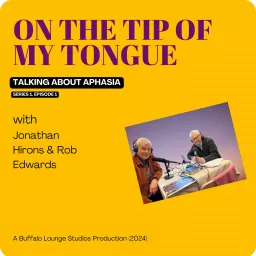On the tip of my tongue - talking about Aphasia

Jonathan Hirons's journey following his stroke and diagnosis of aphasia is both inspiring and informative. Here’s a summary of his experience and insights about aphasia:
Jonathan's Experience with Aphasia
1. Initial Incident:
In January 2019, while in a business meeting, Jonathan began to feel strange and soon realized he could not communicate effectively. His colleagues quickly called for medical help.
2. Medical Emergency:
He was rushed to University College Hospital, where scans revealed he had suffered a stroke due to a bleed on the brain. He spent five nights in the hospital and was diagnosed with aphasia.
3. Impact on Daily Life:
- Jonathan struggled with basic tasks such as speaking, reading, and writing.
- He had memory issues, recalling only his postcode but not his full address or other personal information.
- He faced challenges in understanding spoken language but could still sign his name.
4. Support from Family:
His wife, Ann, played a crucial role in his recovery:
- She encouraged him to read aloud daily and used flashcards to aid in word recognition and writing.
- This early intervention was vital for his rehabilitation.
5. Progress Through Therapy:
With the help of speech therapy, Jonathan made significant improvements:
- He regained much of his ability to read and write, although he still experiences difficulties, especially when tired.
6. Advocacy and Awareness:
- Jonathan has turned his experiences into a creative outlet by producing films, including "On the Tip of My Tongue" and "What is Aphasia?" These films aim to educate others about aphasia and its challenges.
- He actively shares his story to raise awareness about aphasia as a hidden disability and the ongoing need for support beyond initial rehabilitation.
Understanding Aphasia
Aphasia is a language disorder that affects communication abilities, including:
- Speaking: Difficulty in forming words or sentences.
- Understanding: Challenges in comprehending spoken or written language.
- Reading and Writing: Problems with reading text or writing coherently.
Key Takeaways
- Aphasia is often a result of brain damage, commonly from strokes, and can significantly impact daily life.
- Early intervention and support are crucial for recovery.
- Awareness and education about aphasia can help reduce stigma and improve support for those affected.
Jonathan's story highlights the resilience of individuals facing such challenges and the importance of community support in their recovery journey.
Copyright © 2025 Jonathan Hirons/Buffalo Lounge Studios All Rights Reserved.
This film/video/podcast is protected by copyright law. Unauthorized reproduction, distribution, or transmission of this material is prohibited.
For permissions or inquiries, please contact [email protected]

